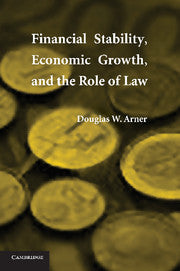Freshly Printed - allow 4 days lead
Couldn't load pickup availability
Financial Stability, Economic Growth, and the Role of Law
This book examines the role of law in financial development and economic growth within institutions.
Douglas W. Arner (Author)
9780521870474, Cambridge University Press
Hardback, published 4 June 2007
382 pages
23.5 x 16 x 2 cm, 0.568 kg
Financial crises have become an all too common occurrence over the past twenty years, largely as a result of changes in finance brought about by increasing internationalization and integration. As domestic financial systems and economies have become more interlinked, weaknesses can significantly impact not only individual economies but also markets, financial intermediaries, and economies around the world. This volume addresses the twin objectives of financial development in the context of financial stability and the role of law in supporting both. Financial stability (frequently seen as the avoidance of financial crisis) has become an objective of both the international financial architecture and individual economies and central banks. At the same time, financial development is now seen to play an important role in economic growth. In both financial stability and financial development, law and related institutions have a central role.
Part I. Finance and the International Financial Architecture: 1. Law, finance, and development
2. Financial stability and the international financial architecture
Part II. Foundations of Finance: 3. Preconditions for and institutional underpinnings of finance
4. Central banking and financial policy
5. Financial infrastructure
Part III. Financial Regulation and Supervision: 6. Banking: regulation, supervision, and development
7. Non-bank finance: securities, insurance, pensions, and microfinance
8. Financial liberalization, financial conglomerates and financial regulatory structure
Part IV. Looking Forward: 9. The international financial architecture
10. Reforming financial systems.
Subject Areas: Financial law [LNP], International economics [KCL]


